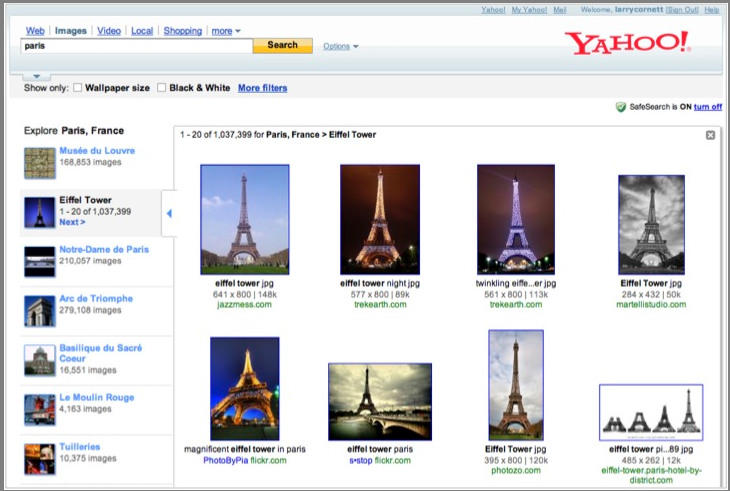Yahoo: We’re Moving From Web Of Pages To Web Of Objects
Yahoo held a search event today in San Francisco at which the company connected the dots among a number of search initiatives that it has rolled out over the past couple of years: Search Assist, BOSS, Search Monkey, Search Pad and oneSearch. There was no announcement but a provocative reframing of all these efforts. The […]
Yahoo held a search event today in San Francisco at which the company connected the dots among a number of search initiatives that it has rolled out over the past couple of years: Search Assist, BOSS, Search Monkey, Search Pad and oneSearch. There was no announcement but a provocative reframing of all these efforts.
The big idea (now familiar) is moving beyond “10 blue links” (popularized as a criticism of search by former Ask CEO Jim Lanzone) to a “web of objects.” The “web of objects” presented by Yahoo is a better representation of the “real world” in search results. In other words: more closely aligning user intent with search results and mapping those to real-world tasks. Conceptually I agree with this approach, even though it doesn’t cover every search use case.
Prabhakar Raghavan, Head of Yahoo! Labs and Yahoo! Search Strategy, explained that this concept was partly drawn from Yahoo’s experience with mobile search. The idea is that people are ultimately trying to actually do things in places and that there’s a larger context to user intent and search behavior. “We’re moving toward surfacing real-world objects rather than documents,” said Raghavan.
Raghavan added that Yahoo is not going to be concerned about index size going forward. Rather Yahoo will be building these composite bundles of structured data. As a practical matter, these web objects are manifested in the form of multi-media content and images (Shortcuts). The broader objective is to provide more context and “answers” to minimize links and clicking back and forth.
Larry Cornett, Vice President, Consumer Products, Yahoo! Search, said that Yahoo was bucket testing different content presentations. In one experimental page he showed a query for “Paris” in which only images were presented.
The context in which all this has perhaps the most obvious and immediate impact is in mobile, as mentioned. Marc Davis, Chief Scientist, Yahoo Mobile, provided a range of mobile search examples from movies to restaurants and travel. These examples were fairly compelling in terms of how oneSearch delivered a range of information and often actionable content within a single click.
As part of his portion of the presentation, Larry Cornett walked the group through the ways that many of Yahoo’s existing technologies are supporting the new conceptual approach:
- Greater insight into user intent (e.g., Search Assist)
- Developing a web of objects (reflected in Shortcuts and non-textual content)
- Open initiatives that tap third parties and the crowd for structured data (i.e., Search Monkey, BOSS)
He also announced that it was the 1st anniversary of Search Monkey and threw out a bunch of stats and milestones:
- It’s in 23 markets globally
- 70 million enhanced Search Monkey results viewed daily
- Search Monkey results see as much as 15% improvement in CTRs
- 15K developers are using it
- Provides partner branding – through video, music, documents, flash games on the SERP
There’s something profound in Yahoo’s concept of “web objects” and the relationship between search and the real world. It’s about building more context into and around search. The challenge for Yahoo is taking this elegant idea or concept and actually making it real for people.
Here’s more from the Yahoo Search Blog. TechCrunch live blogged the discussion.
Contributing authors are invited to create content for Search Engine Land and are chosen for their expertise and contribution to the search community. Our contributors work under the oversight of the editorial staff and contributions are checked for quality and relevance to our readers. The opinions they express are their own.
Related stories
